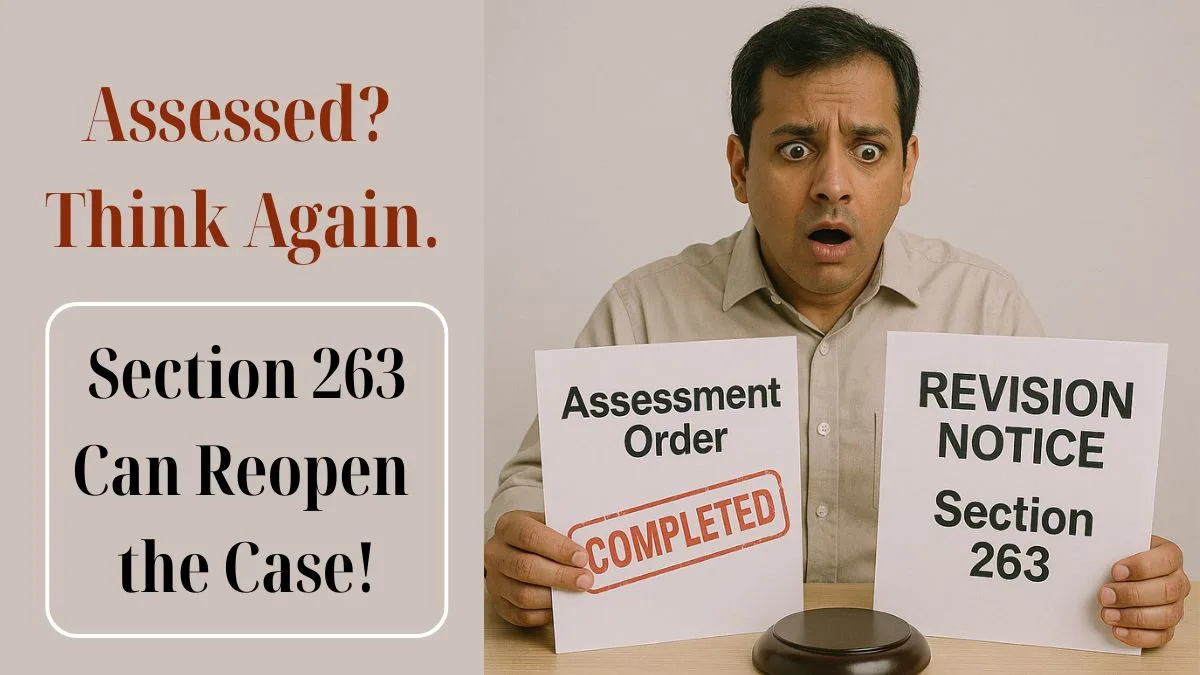
Imagine you filed your income tax return, your assessment is done, & you’re breathing easy, thinking all is settled. But then comes a twist. The Principal Commissioner of Income Tax (PCIT) or Commissioner of Income Tax (CIT) can reopen your case. That too, even if there’s no fraud or concealment. That’s the power of Section 263 of the Income Tax Act.
So what exactly is it? And why should you care? Let’s decode it—plain and simple.
What Is Section 263?
Section 263 empowers the PCIT/CIT to revise an order passed by the Assessing Officer (AO) if they believe it is:
- Erroneous, and
- Prejudicial to the interests of the revenue
It’s the department’s way of saying, “Wait… this assessment doesn’t seem right. Let’s recheck.”"
When Can Section 263 Be Invoked?
This section isn’t triggered randomly. The following conditions must exist:
- The order must be erroneous – Maybe a deduction was wrongly allowed, income underreported, or an exemption was wrongly granted.
- It must be prejudicial to the revenue – If the mistake led to lower tax collection, it qualifies.
- The AO failed to make proper inquiries – If the Assessing Officer accepted facts without verification, that’s a red flag.
For example, if a charitable trust conducts transactions with specified persons, & the AO does not inquire into the genuineness of these transactions, then the CIT can reopen the case. Why? Because it may violate Section 13(3), which defines specified persons & restricts certain dealings with them. Such transactions can affect the tax exemption status of the trust.
A Common Real-Life Trigger
One of the frequent triggers under Section 263 is when the Assessing Officer allows a deduction or exemption without a proper inquiry. For example:
- A trust files returns showing donations and exemptions, but fails to disclose whether the transactions are with defined specified persons.
- The AO completes the assessment without probing the links or validating the disclosures.
- Later, the CIT finds this oversight & decides to revise the assessment under Section 263.
This shows how transactions by charitable trusts with specified persons must be reported transparently & verified adequately to avoid future revisions. "
What's the Timeline for Invoking Section 263?
The revision must be initiated within 2 years from the end of the financial year in which the original order was passed.
So if your original assessment order came on 31st March 2023, the CIT has time until 31st March 2025 to invoke Section 263.
What Is the Process Under Section 263?
Here’s how it usually unfolds:
- Notice is issued to the assessee (you) asking for explanations.
- Hearing is conducted, where you get a chance to present your side.
- Commissioner passes a revisional order, either modifying or cancelling the original order & directing a fresh assessment.
It’s NOT the same as a reassessment or reopening under Section 147. Section 263 doesn’t require new information or escaped income. It simply focuses on whether the AO did their job right.
What You Can Do as a Taxpayer
If you receive a notice under Section 263:
- Don’t panic—it’s not a final order.
- Engage a tax expert to represent your case & explain the position taken in your original return.
- Provide documents, case law, and logic to show that the order is not erroneous or prejudicial to revenue.
If the CIT passes an unfavourable order, you can appeal to the Income Tax Appellate Tribunal (ITAT).
How Section 263 Impacts Charitable Trusts
For charitable trusts, this section is a double-edged sword. If they are found to have conducted transactions by charitable trusts with specified persons, & these transactions weren’t properly disclosed or verified, the exemption granted under Sections 11 and 12 can be withdrawn.
And if the Assessing Officer missed this during the original assessment, the revision under Section 263 becomes a strong possibility.
Hence, compliance with Section 13(3), which clearly defines specified persons, is not optional—it’s critical.
Conclusion
Section 263 serves as a reminder that just because your return is assessed doesn’t mean it’s out of the woods. The Income Tax Department still has a final say, especially when compliance lapses or loose ends are discovered.
And if you’re a trust or institution dealing with specified persons, the scrutiny gets sharper. Always maintain proper records & transparency to avoid revisions under this section.
📢 Need help in responding to a Section 263 notice or want to audit your assessment before the department does? Our experts at Callmyca.com are just a click away—get expert tax support before it’s too late.











